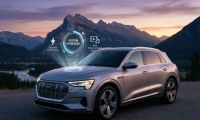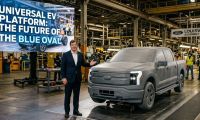Once again, California’s popular Clean Vehicle Rebate Program is in need of funding. On top of a $7,500 federal tax credit, California residents who buy an electric vehicle are eligible for a $2,500 rebate (or $1,500 for a plug-in hybrid). The program has been so successful that it keeps running out of money, as California is the number one state for EV adoption partly due to the generous rebates.
Now a new bill proposes additional incentives for lower-income buyers to be partially funded by capping rebate eligibility at a certain income level, reports the LA Times.
What to do when the well runs dry...
Back in April, the state’s Air Resources Board floated the idea of removing the rebate for plug-in vehicles with a price tag above $60,000. As we opined at the time, the move would have made a lot of sense but also would have been unfair to Tesla, which makes the only $60,000-plus electric car produced in significant volumes.
Thankfully for Tesla, the proposal was dropped as the state provided emergency funding to temporarily extend the rebate program. Over 13,500 people are still on the waiting list, however. It is clear that the Clean Vehicle Rebate Program is running on borrowed time without a long-term solution. It may be that it doesn’t need a long-term solution; some would argue that California’s time for additional EV rebates has passed.
A new proposal with a familiar premise
Remember, the initial proposal was somewhat controversial because it reasoned that customers in the market for a $60,000+ car did not need an extra $2,500 boost from the state. Some Tesla owners argued that the state rebate played a significant role in their purchase decision, but the LA Times reports that almost half of Tesla owners who received rebates have a household income over $300,000 per year.
In addition, four-fifths of California state rebate recipients to date report household income above $100,000. Electric cars are typically priced out of the range of most households making less than that amount, but the state’s logic is that increasing rebates for low-income buyers coupled with falling EV prices will begin to change that.
In the proposed State Bill 1275, the Air Resources Board would be required to set a cap on income eligibility for the clean vehicle rebate. The focus of the bill, however, is on expanding electric vehicle adoption to lower-income and more heavily polluted communities that need the zero tailpipe emissions the most.
The LA Times cites an example where a family of four with a $53,000 household income could get the existing $2,500 rebate for purchasing an electric car, then add on $1,500 for retiring a high-polluting vehicle, then another $3,000 check for a clean air vehicle intended for low-income buyers.
If this family chose to forego cars altogether, the state under the proposal would provide a $3,000 incentive for turning in an old car and purchasing alternative mobility like a bus pass or a car-share membership.
It is important to note that a family with this income would likely not pay enough in taxes to reap the full benefits of the $7,500 tax credit. All the same, the proposed incentives would bring the $29,000 starting price of a Nissan LEAF down to an effective $22,000 without federal incentives. But that illustrates the problem California is up against: a family of four making $53,000 still will have difficulty affording that electric car without a bargain lease deal.
Should this bill become law?
The bill has passed the state Senate and will be considered by the Assembly’s appropriations committee, and must gain final passage by August 31 to move on to Governor Jerry Brown.
For his part, Sen. Kevin de Leon is focused on providing incentives to those that actually need them. "A $2,500 rebate to purchase an electric vehicle is not likely to matter to someone earning over $300,000 a year, but it does make a big difference to someone earning $60k a year," Senator de Leon pointed out. "Every community deserves clean air, regardless of wealth."
Though data has shown that most electric vehicle owners are not "wealthy" as the label is usually applied, the fundamental premise of this legislation is a good one: high-income EV buyers do not need the rebates and the money would be better spent incentivizing lower-income families to go electric.
It isn’t quite redistribution of wealth, or the dreaded S-word; rather, it gives a broader demographic a chance at electric vehicle ownership that it otherwise wouldn’t have had. Depending on where the Air Resources Board would set the income cap, the wealthier buyers might not even notice they missed out on the rebate.
We can debate how successful such a program would be – it can target low-income communities all it wants, but a family that lives from paycheck to paycheck is unlikely to even be considering a brand new car. It may find a sweet spot in the $60,000-$80,000 income range, where families can realistically afford a new car if the price is right.
What shouldn’t be debated, however, is that the underlying principle is sound. It might hurt Tesla a little bit, but if the income cap is set appropriately the proposed legislation shouldn’t be considered unfair to the wealthy.
What do you think? Feel free to leave comments below.
Set Torque News as Preferred Source on Google












Comments
The proposed incentives,
Permalink
The proposed incentives, would subsidize rich polluters like Tesla and it's rich customers that don't care about the environment. Many families have a much lower income and $53,000.
Some legislators are considering giving Tesla more EPA waivers, yet touting it as environmentally friendly. It's a snow job. Where are all the Tesla fan boys that have been spamming news comments claiming that Tesla is environmentally friendly? Why aren't they raising Cain about proposals to put the government and greedy big business like Tesla in bed together, to further pollute our environment and exploit our resources?
Why are most if not all of the areas that Tesla is considering for a battery factory, areas that are likely do more harm to the environment and puts more strain on our resources? Why are most places that are being considered, places that heavy metals and other toxic chemicals from manufacturing Tesla batteries, are more likely to contaminate the soil and water table? Why are most, if not all places being considered, areas that there are water shortages? Why aren't the Tesla fan boys that claim to care about our environment and society; not complaining that the Tesla plant will be diverting more water away from agriculture for food, to manufacturing? Just goes to show that Tesla fan boys don't really care about the environment, our natural resources, our food supply, our economy, the poor, etc...
Goes to show you many of the people that claim they are promoting "clean technology" are eager to destroy the environment for money. They are liars.
Well I do agree that the
Permalink
In reply to The proposed incentives, by Jim (not verified)
Well I do agree that the proposed legislation does subsidize the "rich" which was the intended question raised in the article. . Polluters exist in all levels of the economic spectrum. Oil, gas and coal companies also put profits above public health concerns and this thinking may be more common that your above statement may suggest.
One of the objectives of the
Permalink
In reply to Well I do agree that the by mike w (not verified)
One of the objectives of the proposed legislation is not to subsidize the rich, and that is the larger issue. The existing incentives do offer rebates to those who don't really need them, while the proposed legislation would eliminate rebates for the wealthy and instead give them to lower-income families. Well-intentioned, but I wonder at its effectiveness.
Why not just dump the
Permalink
Why not just dump the incentives all together? Better yet, dump the taxes that these "rebates" come from. Currently, 23 states have no state income tax. Why do the others think they need one and why do people put up with being double-taxed in this way?
Subsidies, rebates, and
Permalink
Subsidies, rebates, and incentives are all a corruption of a free market. It's all a form of bureaucratic central planning which didn't work in the former USSR and is a failure here as well. Taking money from one individual to give to another is theft.